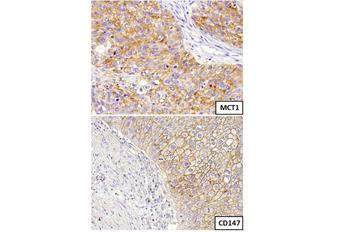Associação Portuguesa de Investigação em Cancro
CD147 and MCT1 in bladder cancer aggressiveness and chemoresistance
CD147 and MCT1 in bladder cancer aggressiveness and chemoresistance

Little is known about the metabolic adaptations that alter the tumour microenvironment and thus contribute to chemoresistance in urothelial bladder cancer (UBC). Here we describe that CD147 and MCT1 overexpression associates with UBC aggressiveness. Moreover, platinum-treated patients with MCT1 and CD147 positive tumours have worse prognosis. CD147 depletion reduces MCTs expression and improves cisplatin response in UBC cells. Our results provide novel insights for the involvement of CD147 and MCTs in UBC progression and chemoresistance.
Julieta Afonso, B.Sc., Ph.D. (a, b) Lúcio L. Santos, M.D., Ph.D. (c, d) Vera Miranda-Gonçalves, B.Sc., M.Sc. (a, b) António Morais, M.D. (e) Teresina Amaro, M.D. (f) Adhemar Longatto-Filho, B.Sc., Ph.D., P.M.I.A.C. (a, b, g, h) Fátima Baltazar, Pharma.D., Ph.D. (a, b)
(a) Life and Health Sciences Research Institute (ICVS), School of Health Sciences, University of Minho, Braga, Portugal
(b) ICVS/3B’s - PT Government Associate Laboratory, Braga/Guimarães, Portugal
(c) Department of Surgical Oncology, Portuguese Institute of Oncology (IPO), Porto, Portugal
(d) Faculty of Health Sciences, University Fernando Pessoa (UFP), Porto, Portugal
(e) Department of Urology, Portuguese Institute of Oncology (IPO), Porto, Portugal
(f) Experimental Pathology and Therapeutics Research Center, Portuguese Institute of Oncology (IPO), Porto, Portugal
(g) Laboratory of Medical Investigation (LIM 14), Faculty of Medicine, São Paulo State University, S. Paulo, Brazil
(h) Molecular Oncology Research Center, Barretos Cancer Hospital, São Paulo, Brazil
The relapsing and progressive nature of bladder tumours, and the heterogeneity in the response to cisplatin-containing regimens, are the major concerns in the care of urothelial bladder carcinoma (UBC) patients. The metabolic adaptations that alter the tumour microenvironment and thus contribute to chemoresistance have been poorly explored in UBC setting. We found significant associations between the immunoexpressions of the microenvironment-related molecules CD147, monocarboxylate transporters (MCTs) 1 and 4, CD44 and CAIX in tumour tissue sections from 114 UBC patients. The presence of MCT1 and/or MCT4 expressions was significantly associated with unfavorable clinicopathological parameters. The incidence of CD147 positive staining significantly increased with advancing stage, grade and type of lesion, and occurrence of lymphovascular invasion. Similar associations were observed when considering the concurrent expression of CD147 and MCT1. This expression profile lowered significantly the 5-year disease-free and overall survival rates. Moreover, when selecting patients who received platinum-based chemotherapy, the prognosis was significantly worse for those with MCT1 and CD147 positive tumours. CD147 specific silencing by small interfering RNAs (siRNAs) in UBC cells was accompanied by a decrease in MCT1 and MCT4 expressions and, importantly, an increase in chemosensitivity to cisplatin. Our results provide novel insights for the involvement of CD147 and MCTs in bladder cancer progression and resistance to cisplatin-based chemotherapy. We consider that the possible cooperative role of CD147 and MCT1 in determining cisplatin resistance should be further explored as a potential theranostics biomarker.
Molecular Carcinogenesis
http://onlinelibrary.wiley.com/doi/10.1002/mc.22222/abstract




